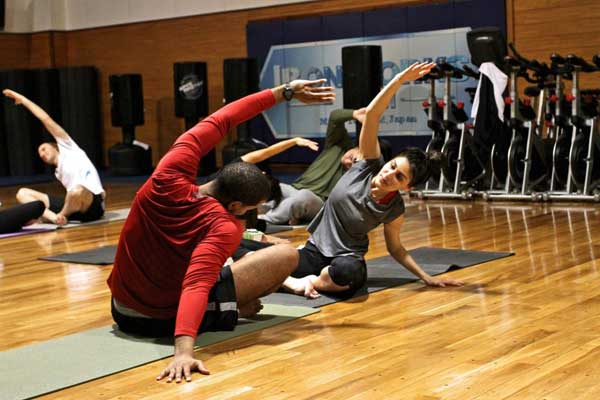In many ways, the gym is a microcosm of work, family and life. The way you interact while working out can have a big impact on your personal and professional life. Here are some things I’ve learned at the gym:
You Get Better With Practice
This may evoke a “duh” response, but in my practice as a coach, I have seen many young professionals refuse to accept where they are and hope to skip ahead. But, you don’t become a veteran overnight. You have to be a grasshopper before you become a Kung Fu master.
Professional achievement and skill development are sometimes too incremental to register, but if you pay attention to the fine points, the elements, to specific segments of your work, you will notice gains, just as you see the weight stack get heavier. You are building something. Choose an aspect of your work or life that you’d like to improve and track your progress over time.
Learn From Those With Experience
Gyms employ personal trainers who have knowledge, education and training with respect to body mechanics, exercise and nutrition. They are there to show us the ropes. After assessing our strength, range of motion and any limitations, they will usually provide an initial orientation and offer a few free sessions to acclimate and to occasionally change the program. They will demonstrate how to use the equipment, give tips to correct our form and select the initial settings.
In a profession, it is tremendously helpful to watch experts at work and ask for guidance. I had the benefit of working with an accomplished trial lawyer for a couple of years when I started practicing law. He took me to depositions, oral arguments, and later I second-chaired trials with him. Over that time, I saw him negotiate many difficult situations. For years after we stopped working together, I would still stop and ask myself “what would Bob do right now?”
I had another boss who was an amateur actor and when I was preparing for my first jury trial, I asked him something I had not been able to figure out from research—exactly how and when can written answers to interrogatories be moved into evidence? Rather than explaining it, he jumped up from his chair, came around the desk and began acting it out—both the judge’s part and the attorney’s. It was not only educational, it was entertaining too.
If you don’t have bosses like these, find opportunities to observe the experts. If someone is doing something you’re interested in, ask how he or she did it. If possible, ask to attend meetings, sales pitches, negotiations and arguments—whatever skill set you want to build. It may not be a revenue-producing event, but it will pay off in the long run and boost your confidence when you get it done.
Many years ago, I was handling a construction litigation case and read about a lawyer who had just gotten a great result in a similar case. I called to ask him a few questions and he invited me to his office. When I arrived, he brought me to a conference room where the table was lined with boxes—the whole case was there: expert reports, OSHA materials, discovery, etc. It was a blueprint of how to put a case together.
Why would he do that? For one thing, law is a profession that expects practitioners to help each other. He was also secure enough to know that there are enough cases to go around. It doesn’t hurt to ask for help because the worst case scenario is that you don’t get a response. On the other hand, you may get what I did—pure gold.
Leave Things Better Than How You Found Them
My mother taught me this as a kid. If we went to a park and there was trash on the grass, she would pick it up and put it in the receptacle.
Sure, it’s inconvenient when the person before you doesn’t wipe down the machine despite all the signs telling us to do so. Wipe it down and, when you’re done, wipe it again.
This is a way of leading by example and modeling valued behavior in order to see more of it. Just like my mom did. You can also improve someone’s day through words of encouragement, helping them increase their understanding of a situation or problem and increasing awareness. In this way, you also leave things better than you found them.
Be Friendly
I’ve belonged to many yoga and Pilates studios and gyms over the years. Typically, people go at the same time of day or attend particular classes, and after a while, the faces become familiar and I’ve gotten to know many of the regulars. Having acquaintances at the gym makes it a more pleasant experience and social interaction is a crucial ingredient to happiness at the gym, at work, or wherever you may be. As a bonus, I have gotten clients from exercise classes simply by being friendly and talking about what I do.
Leave Politics Behind
Of course, just like in life, not every interaction at the gym is pleasant. There is a standoff at my gym between the Fox News watchers and the CNN watchers. I stay as far away from that as possible because I’m there to work out and have pleasant interactions before beginning my work day.
Don’t get involved in partisan politics at work. Even talking with people you agree with could be overheard or get overheated.
Take Breaks
When you’re doing reps on a machine, it’s important to take breaks between them. The same is true at work. No matter how busy you are, take breaks during the day to re-energize yourself. Find people to have lunch with, even if it’s a brief one.
Rest
Trainers will not permit clients to weight train two days in a row because the muscle breaks down and must rebuild. While people understand not to overuse muscle groups, many fail to give the brain a rest. Adequate sleep is critical to good decision-making, judgment, focus and endurance. Your career is a marathon, not a sprint. There will be times when you have to work longer and harder than others, but make sure that you take time to replenish the reserves.
Vary the Routine
According to my trainer, there are numerous benefits to mixing up a workout routine such as stimulating different muscle groups and preventing burnout. The same is true for life. While routines are great to have, changing them from time to time should make it easier to stay committed over the long haul.
Don’t Bogart the Bench Press
It’s frustrating to wait while someone does seemingly endless sets on a machine, including a copy machine. Be mindful of hogging resources because it has an impact on relationships with co-workers. Let someone else work in a set when you can. Be generous.
Set Goals
You can do more than you think you can. People use trainers not only for their specialized expertise, but also because they exhort you to push yourself and hold you accountable for the goals that you set. It is human nature to doubt your ability, but the only way to grow is a willingness to try new things, especially in the face of fear. Find a way to hold yourself accountable for what’s important.
Create Routines Around Important Goals
I put gym days on my calendar. I work with the trainer only twice a week and want to get there a few additional times, so I choose classes and put them on my schedule. That way, it becomes a habit and I won’t have to think about it and decide. I just go. You can do the same thing at work and in any area of life. If there are clients or friends you’ve been meaning to call, put it on your schedule so it will get done. Calendarize what’s important.
I hope these ideas help you have a better work life, home life and gym life.
Reprinted with permission from the October 24, 2018 edition of “The Legal Intelligencer” © 2018 ALM Media Properties, LLC. All rights reserved. Further duplication without permission is prohibited. For information, contact 877-257-3382, reprints@alm.com or visit www.almreprints.com.








